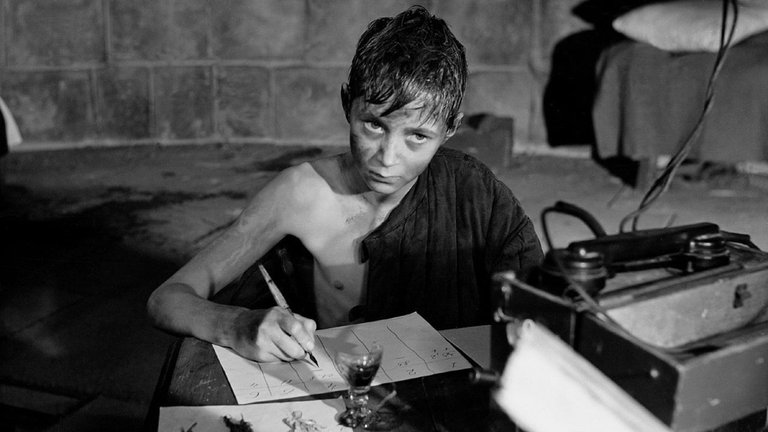
Andrei Tarkovsky, while not the most prolific of filmmakers, has nonetheless secured his place as one of the titans of Russian, Soviet, and world cinema. His reputation is built upon a handful of feature films that showcase his unique vision and artistic prowess. This acclaim began with his celebrated feature debut, Ivan’s Childhood (1962), a poignant war drama that explores the devastating impact of conflict through the eyes of a child.
Ivan’s Childhood is adapted from the 1957 short story "Ivan" by Vladimir Bogomolov, a writer whose experiences as a Red Army officer during World War II heavily influenced his literary work. The film follows the harrowing journey of its young protagonist, Ivan Bondarev, portrayed by Nikolai Burlyayev. At just twelve years old, Ivan finds himself thrust into the brutal realities of war after losing his entire family to German forces. His initial appearance in the film depicts him crossing front lines to report to a Red Army unit led by the young Lieutenant Galtsev (Evgeny Zharikov). Galtsev is taken aback to discover that Ivan possesses invaluable intelligence for Lt. Colonel Gryaznov (Nikolai Grinko) and Captain Kholin (Valentin Zubkov). The boy's tragic past fuels his desire for vengeance, driving him to utilise his small stature to slip between the lines and gather information about the enemy. Despite Gryaznov’s intentions to protect Ivan by sending him to safety away from the front lines, the boy repeatedly escapes back into danger. The story culminates in a reconnaissance mission across a river separating Soviet and German forces, where Ivan’s fate becomes intertwined with the broader consequences of war.
Ivan's Childhood was produced during the period known as "Khrushchev's Thaw," a time when Soviet authorities began to loosen their tight grip on culture and allow artists a little more creative freedom. This led to a new approach to depicting the Great Patriotic War, with filmmakers, starting with Mikhail Kalatozov in The Cranes Are Flying, portraying it as a cataclysmic tragedy rather than a glorious triumph of the Soviet collective. Ivan's Childhood clearly belongs to this trend, presenting a powerful and unflinching portrayal of the devastating consequences of war.
One of the most striking aspects of Ivan’s Childhood is its portrayal of tragedy through the lens of childhood. Ivan is depicted as a boy hardened by his experiences; his singular focus on vengeance starkly contrasts with the adults around him who acknowledge that "war isn’t for children." Galtsev embodies youthful idealism and intellectual pursuits, while Kholin finds moments to flirt with Masha (played by Valentina Malyavina), a young medical officer. In contrast, Ivan's character is devoid of such distractions; his existence revolves solely around survival and retribution. Flashbacks provide fleeting glimpses into Ivan’s innocent pre-war life, particularly through dream sequences featuring his mother potrayed by Irma Raush, actress who was Tarkovsky’s wife at the time.
The film further illustrates the destructive psychological impact of war on youth through Ivan's worldview, which becomes dominated by hatred towards Germans and everything German. This perspective resonates deeply with Tarkovsky's own experiences; notably, his wife was of German descent. Galtsev's admiration for German artist Albrecht Dürer adds an ironic layer to this narrative, especially when Ivan disdainfully comments on Dürer's famous etching Four Riders of the Apocalypse. The film culminates in disturbing documentary footage revealing the corpses of Joseph Goebbels’ children, poisoned by their own parents during the fall of Berlin—a haunting reminder that war destroys innocence regardless of artificial lines of nationality or ethnicity.
Tarkovsky's journey with Ivan’s Childhood was marked by serendipity; he was not initially slated to direct but was commissioned by Mosfilm after dissatisfaction with Eduard Babalov's earlier version of the film. His casting of Nikolai Burlyayev proved fortuitous; Burlyayev delivered an exceptional performance that would later lead him to collaborate again with Tarkovsky in Andrei Rublev and deliver another memorable role. Additionally, cinematographer Vadim Yusov played a crucial role in shaping the film's haunting visual style through black-and-white cinematography that captured both apocalyptic destruction and moments of serene beauty—elements that would influence Tarkovsky's later works.
Despite its emotional power and artistic merit, Ivan’s Childhood reflects an author still in search of his definitive style. With a runtime of just over ninety minutes—short by Tarkovsky’s standards—the film contains elements that may feel redundant or underdeveloped. For instance, Masha's character seems to serve primarily as a token romantic subplot rather than contributing significantly to the narrative. Furthermore, the film's ending juxtaposes live action with documentary footage in a manner that may not resonate as effectively with contemporary audiences accustomed to more polished cinematic techniques.
Nevertheless, Ivan’s Childhood struck a deeply personal chord within Soviet audiences at a time when memories of war were still raw. Many viewers could identify with Ivan or knew someone who shared his tragic fate. This emotional resonance contributed to its status as a box office success and solidified its position as Tarkovsky's most commercially successful film.
The critical reception of Ivan’s Childhood represented even bigger triumph. The film garnered prestigious accolades, including the Golden Lion at the 1962 Venice Film Festival, marking it as one of the most critically acclaimed Soviet films ever made. Renowned filmmaker Ingmar Bergman praised Tarkovsky's work, positioning him as a potential successor within arthouse cinema—a testament to Tarkovsky’s immediate impact on global filmmaking.
In subsequent years, Ivan’s Childhood has been cited as an inspiration by many esteemed filmmakers such as Sergei Parajanov and Krzysztof Kieślowski. While it may not fully encapsulate Tarkovsky’s later god-like reputation among cinephiles worldwide, it remains an essential viewing experience—an exploration not only of artistic talent but also a stark reminder of war's profound effects on humanity.
RATING: 7/10 (+++)
Blog in Croatian https://draxblog.com
Blog in English https://draxreview.wordpress.com/
InLeo blog https://inleo.io/@drax.leo
Hiveonboard: https://hiveonboard.com?ref=drax
InLeo: https://inleo.io/signup?referral=drax.leo
Rising Star game: https://www.risingstargame.com?referrer=drax
1Inch: https://1inch.exchange/#/r/0x83823d8CCB74F828148258BB4457642124b1328e
BTC donations: 1EWxiMiP6iiG9rger3NuUSd6HByaxQWafG
ETH donations: 0xB305F144323b99e6f8b1d66f5D7DE78B498C32A7
BCH donations: qpvxw0jax79lhmvlgcldkzpqanf03r9cjv8y6gtmk9